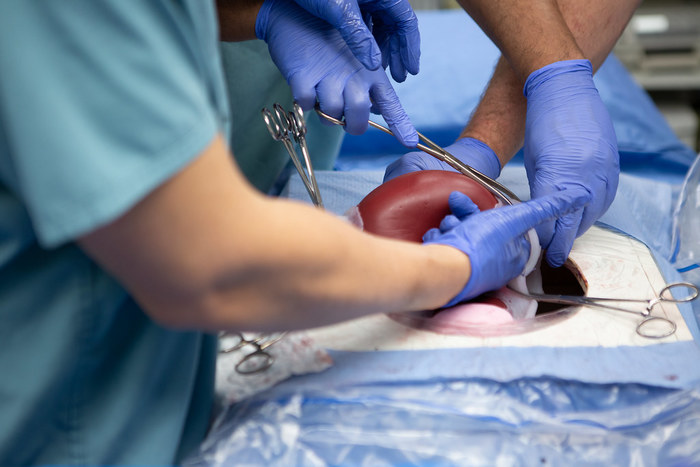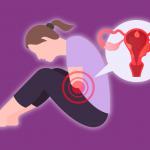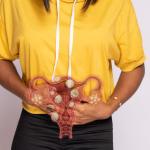
What to Expect After a Hysterectomy (And Why You Should Avoid Them)
If you are considering having a hysterectomy to remove your fibroids, we want you to know there are other options. The complete surgical removal of the uterus involves a number of risks, significant recovery time, and lifelong health consequences that you should carefully weigh before making this decision.
At USA Fibroid Centers, we aim to educate women on their full range of available fibroid treatments. We specialize in a minimally-invasive option called Uterine Fibroid Embolization (UFE). UFE involves less risk, no hospital stay, a significantly shorter recovery, and quick relief from painful fibroid symptoms.
Below, you will find helpful information on life after a hysterectomy and our minimally-invasive alternative. To help inform your treatment decision, here’s what you need to know.
What to Expect After a Hysterectomy
A hysterectomy is performed in a hospital while under general anesthesia. You can expect to stay there for one to two days after your surgery. A full recovery after a hysterectomy takes six to eight weeks.
During this time, you will be advised not to lift heavy objects or participate in strenuous activities. You will not be able to drive when taking prescription pain relievers. In addition, wearing a seatbelt may be uncomfortable. We recommend asking for help with daily tasks like shopping, cooking, household chores, and caring for young children.
You should be aware that, similar to other surgical procedures, a hysterectomy has some inherent risks. These include:
- An adverse reaction to general anesthesia
- Excessive blood loss
- Development of blood clots
- Infection
If you have concerns about your healing after a hysterectomy at any point, you should contact your doctor immediately.
Pain After a Hysterectomy
Because you will be placed under general anesthesia, you won’t experience any pain during the actual surgery. Once you wake up, however, it is common to feel pain. Many women also experience nausea and fatigue. Your nurse can give you pain and nausea-relieving medications so that you can rest comfortably and begin your recovery.
You will be sent home with prescription pain medications to take as needed. You can ask your doctor about the use of over-the-counter options, too. In general, you should try to take it easy and get plenty of rest in the coming days and weeks. Your pain will decrease over time.
Weight Gain After a Hysterectomy
Many women are concerned about gaining weight after a hysterectomy. This may occur because you may not be able to exercise or follow your usual diet during your recovery. When we eat more calories than we burn, we gain weight. This type of post-surgical weight gain is usually temporary and should resolve once you are back to your regular diet, exercise routine, and daily activities.
Since your activity level will be lower than normal during your recovery, we suggest that you focus on eating a healthy, well-rounded diet with plenty of protein, whole grains, low-fat dairy, fruits, and vegetables. You’ll also want to avoid excessive sodium and added sugars. The good news is that along with helping to prevent weight gain, eating well can promote faster healing.
Beyond your initial recovery, ongoing weight gain can also be an issue. This is more likely to occur when the ovaries are removed along with the uterus. Ovary removal permanently impacts your body’s hormones and can place you into early menopause. Unfortunately, early menopause can lead to increased Body Mass Index (BMI).
Other potential effects of early menopause include:
- Irregular or missed periods
- Hot flashes
- Night sweats
- Vaginal dryness
- Urinary issues
- Emotional changes
- Dry skin
- Decreased sex drive
- Insomnia
- Infertility
Before committing to this life-altering surgery, carefully consider what your quality of life after a hysterectomy would look like. We want you to understand that non-surgical alternatives can help you avoid hormonal weight gain and other undesirable effects of early menopause.
Weight Loss After a Hysterectomy
Conversely, some women may lose weight instead of gaining it after a hysterectomy. This is usually temporary and related to nausea. If you experience nausea due to the effects of anesthesia or pain medications, you probably won’t feel like eating or drinking much, if anything at all.
However, it is crucial to your healing to properly nourish your body at this time. Start with bland foods like saltines. Try drinking ginger ale. Then, focus on eating high-protein foods, which will aid your recovery. Also, eating high-fiber foods can help ease constipation, which is often tied to nausea.
If you continue to struggle with eating and drinking, ask your doctor about taking anti-nausea medications and/or laxatives. If you are unable to keep food and drink down, you may require intravenous (IV) fluids.
Cramps After a Hysterectomy
You may experience pelvic cramps and discomfort during your recovery from hysterectomy. You may also develop abdominal cramps as a result of digestive issues. Getting sufficient rest, eating properly, and taking pain relievers as recommended should help.
Rarely, women can develop new issues with cramps after a hysterectomy. This may occur due to ovarian issues, muscle spasm, or the development of scar tissue. If you experience any cramping beyond your recovery period, contact your doctor to determine its source.
What Not to Do After a Hysterectomy
There are a number of physical activities that you should not attempt soon after a hysterectomy. These include:
- Lifting heavy objects: This involves anything more than 10 pounds.
- Strenuous physical activity: Walking, however, is encouraged.
- Caring for young children alone: Recruit your friends and family to help.
- Driving: Do not drive while under the influence of pain medications.
- Using tampons: Avoid inserting anything in the vagina during your recovery.
- Having sex: Allow your body some time to heal and then talk to your doctor when you feel ready for intimacy.
Minimally-Invasive Alternatives to a Hysterectomy
There’s no doubt that a hysterectomy is an effective method to remove fibroids and eliminate fibroid symptoms. It is also the only fibroid treatment that 100 percent guarantees your fibroids won’t ever return.
But it’s also major surgery that comes with inherent risks, a lengthy recovery, and the possibility of early menopause. Understandably, you may wish to avoid a hysterectomy as fibroid treatment.
Fortunately, there are other available methods. Our minimally-invasive, outpatient treatment known as Uterine Fibroid Embolization can shrink your fibroids and provide quick relief for painful, uncomfortable, and inconvenient symptoms.
During UFE, one of our fibroid specialists uses ultrasound guidance to insert a tiny catheter into the main uterine artery. Then, they inject embolic materials to block blood supply to the fibroid(s). This causes your fibroid to wither away and eventually die.
Uterine Fibroid Embolization offers many benefits over hysterectomy, such as:
- Involves less risk than surgery
- Takes only 30 to 45 minutes
- Performed as an outpatient procedure, so you can go home the same day
- Leaves the uterus fully intact
- Your fertility can be preserved
- Helps avoid early menopause
- Has a short recovery of only one to two weeks
- Can quickly eliminate your fibroid symptoms and get you back to normal life
Contact USA Fibroid Centers Today!
To learn more about available fibroid treatments, schedule an appointment online today. We can help you weigh the pros and cons of what to expect after a hysterectomy vs. Uterine Fibroid Embolization.
We offer dozens of USA Fibroid Centers locations nationwide. Or, you can attend a virtual doctor visit with one of our top-rated specialists. Wherever we meet, we look forward to helping you regain control of your life!



